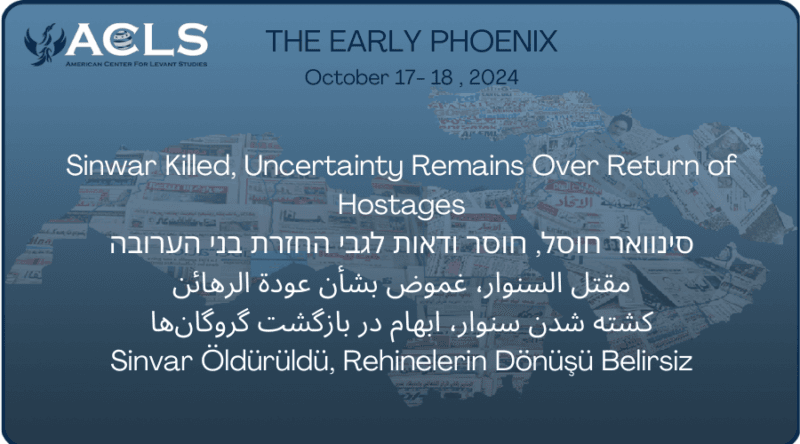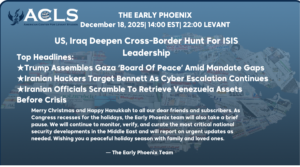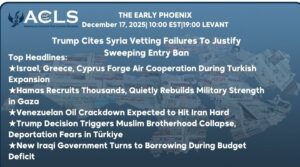
★ ISRAEL-HAMAS WAR
-
Sinwar Killed by Israeli Forces in Rafah
Yahya Sinwar, mastermind of the October 7 assault, was killed on Wednesday by Israeli forces in Rafah. The 828th Brigade identified suspicious figures at 10:00 a.m., leading to drone surveillance confirming his companions nearby by 3:00 p.m. After tank fire targeted the building, Sinwar retreated to a second-floor room, where he was injured. Israeli media released footage showing his last moments throwing a bomb before being shot. A second tank shell killed him. Sinwar was found with an Israeli officer’s pistol, which he had previously displayed as a symbol of a failed Israeli operation. His death, confirmed through DNA tests, was a result of young soldiers rather than intelligence planning.
-
Yahya Sinwar’s Radical Leadership, Iran Ties, and October Attacks
Yahya Sinwar, born in 1962 in Khan Younis, Gaza, became one of Hamas’ most radical leaders. Known as the “Butcher of Khan Younis” for his role in executing Palestinians accused of collaborating with Israel in the late 1980s, his ruthless methods cemented his feared status within Hamas. After serving 22 years in Israeli prison, Sinwar was released in a 2011 prisoner exchange. His influence grew quickly, and in 2012, he visited Iran, strengthening Hamas’ ties with Tehran. This visit solidified his strategic connections with regional allies, particularly Hezbollah and Iran. Sinwar rose to lead Hamas in Gaza in 2017 and masterminded the October 7, 2023, attacks on Israel. Known for his unwavering commitment to Hamas’ goal of eliminating Israel, Sinwar remained unapologetic for the attacks, which prompted a large-scale Israeli offensive, leading to the deaths of thousands of Palestinians, significant destruction in Gaza, and severe damage to Hezbollah in Lebanon
-
Hamas Faces Leadership Crisis After Sinwar’s Assassination
The assassination of Yahya Sinwar, Hamas’s key military and political leader, has left the group in turmoil, struggling to find a suitable replacement. Sinwar’s close relationship with Iran and Hezbollah, coupled with his control over the Qassam Brigades, made him a central figure in Hamas’s operations. His death has created a leadership void, slowing decision-making and threatening the movement’s cohesion. Potential successors include Sinwar’s brother Mohamad, Khalil al-Hayya, Khaled Meshaal, Musa Abu Marzouk, Zaher Jabarin, and Muhammad Ismail Darwish, each facing significant challenges as Israel continues its strikes on Gaza.
-
Over 30 Palestinians Killed in Israeli Airstrikes on Gaza
Israeli airstrikes on Gaza killed over 30 Palestinians, including children, as the northern Gaza Strip faces a stifling siege. A strike on a school sheltering displaced people in Jabalia killed 19 and injured dozens. Israel confirmed the strike targeted Hamas and Jihad militants, publishing the names of 12. In the West Bank, Israeli forces shot and killed a Palestinian woman picking olives near Jenin. Since the war began in October 2023, over 42,000 Palestinians have been killed, while Israel continues operations against Hamas militants across Gaza.
-
Gaza Unemployment Reaches 80% Amid Economic Collapse
The International Labour Organization reported Gaza’s unemployment has surged to 80%, with the economy contracting by 85%, pushing 2.3 million residents into severe poverty. In the West Bank, unemployment hit 34.9%, with a 21.7% economic contraction, severely impacting both regions’ socio-economic stability.
-
Netanyahu, Gallant, Halevi Speak After Yahya Sinwar’s Assassination
Following the killing of Hamas leader Yahya Sinwar, Israeli Prime Minister Netanyahu declared it “the beginning of the day after Hamas,” urging militants to surrender and hand over hostages. Defense Minister Yoav Gallant described Sinwar as a cowardly murderer who fled before being killed, reinforcing that the Israel Defense Forces (IDF) would continue pursuing those threatening Israel. IDF Chief Herzi Halevi praised the professionalism of the forces and emphasized that the decision to maintain operations in Gaza, including Rafah, was validated by the outcome. Israel is expected to escalate military pressure in Gaza following Yahya Sinwar’s death. Plans include continuous aerial attacks and advancing ground forces.
-
Jordanian Infiltrators Killed in Dead Sea Attack, Two Injured
Two Jordanian infiltrators were killed after opening fire near Neot Kikar in the Dead Sea area, injuring two Israeli soldiers. The attackers, dressed in military uniforms, crossed the border from Jordan and engaged an Israeli military unit before being neutralized by Israeli forces. The Israeli Defense Forces are continuing their search for any additional threats in the area. This is a developing story.
===========
★ ISRAEL-HEZBOLLAH WAR
-
Hezbollah Vows Escalation After Sinwar’s Assassination, Iran Pledges Resistance
Following the assassination of Hamas leader Yahya Sinwar, Hezbollah announced a “new and escalatory phase” in its conflict with Israel, using precision-guided missiles for the first time. The group claimed to have caused 55 Israeli deaths and over 500 injuries since ground confrontations began on October 1. Iran praised Sinwar, sharing images of his last moments and claiming his death will inspire future resistance.
-
Israel Kills Hezbollah Commander, Hezbollah Responds With Missiles
Israeli forces killed Hezbollah commander Muhammad Hussein Rammal in border clashes. Israel issued evacuation orders for southern Lebanon, anticipating further strikes. Five Israeli soldiers died in combat, raising the total Israeli military death toll to 745. Press TV, citing Hezbollah, also stated that 17 Israeli troops were critically injured. Hezbollah fired missiles at the Zvulun settlement, claiming retaliation for Israeli attacks on southern Lebanese villages. Fifteen rockets were launched from Lebanon, activating air raid sirens in Acre, Haifa Bay, and Galilee. No casualties have been reported from the Hezbollah missile strikes, which occurred at 7:00 a.m.
-
German UNIFIL Warship Downs Drone Near Lebanon Coast
A German warship, part of the UNIFIL mission, brought down an unmanned aerial vehicle off Lebanon’s coast using electronic countermeasures, as confirmed by the German defense ministry. The corvette Ludwigshafen am Rhein caused a controlled crash of the drone. The origin of the drone remains unclear, and the warship continues its operations. There were no additional details provided regarding the drone’s ownership or mission.
-
Hezbollah Fires Rockets at Kiryat Shmona; Targets Merkava Tanks
Hezbollah announced it fired a rocket barrage at Kiryat Shmona, with Israeli media reporting a serious incident involving a drone. Ten rockets were launched toward Kiryat Shmona and nearby towns in northern Israel. Hezbollah targeted a Merkava tank on Har el-Lebunah with a guided missile, causing casualties among the crew. A second Merkava tank was also attacked later, resulting in additional injuries.
-
Israel Kills Hezbollah Commander and Dozens in Airstrikes
Israel announced the killing of Hezbollah battalion commander Hussein Muhammad Awada in Bint Jbeil and dozens of fighters in southern Lebanon. Israeli army spokesman Avichai Adraee confirmed that airstrikes targeted Awada, who was responsible for shelling Israel. Over the past 24 hours, ground forces and air support killed more than 45 Hezbollah members and destroyed over 150 targets.
-
Israeli Airstrikes Intensify; Israeli Flag Raised in Aita ash-Shab
The conflict between the Israeli army and Hezbollah intensified on Thursday, with airstrikes targeting multiple sites in southern Lebanon. Israeli Channel 12 reported the raising of the Israeli flag in Aita ash-Shab. Hezbollah claimed to have targeted an Israeli military gathering in the Sedana area of the Shebaa Farms. Additionally, Israeli aircraft struck Sarine, Safri, and Tammnine in the Bekaa Valley. The Israeli military issued evacuation warnings before these airstrikes, indicating heightened tensions in the region.
-
US Sanctions Ten Individuals Funding Hezbollah Through Captagon Trafficking
The Biden administration sanctioned ten individuals and entities in Lebanon and Syria for funding Hezbollah through Captagon trafficking. Acting Treasury Under Secretary Bradley Smith noted Hezbollah’s destabilizing influence in Lebanon and the region. The sanctions target three Lebanese nationals and four companies involved in a sanctions evasion network generating revenue for Hezbollah.
===========
★ IRAN
-
Iran Responds to Yahya Sinwar’s Death, Vowing Strengthened Resistance
Following the killing of Hamas leader Yahya Sinwar by Israeli forces, Iran’s mission to the United Nations declared that his death would fortify the spirit of resistance in the region. Iran emphasized that Sinwar’s legacy will inspire youth and children to continue his fight for Palestinian liberation. The statement, shared on X, highlighted that “as long as occupation and aggression exist, resistance will endure.” Iran referred to Sinwar as a “martyr,” stressing that his memory would inspire ongoing resistance efforts.
-
Netanyahu Approves Target List for Retaliatory Strikes Against Iran
Israeli Prime Minister Benjamin Netanyahu approved a list of targets inside Iran. Although specific targets were not disclosed, an Israeli source confirmed Netanyahu’s authorization of the strikes. Israel’s UN Ambassador, Danny Danon, warned that the response would be “extremely painful” to deter future attacks from Iran.
-
Iranian Commander Warns Israel of “Painful” Retaliation for Any Attack
Iranian Revolutionary Guard Commander, Major General Hossein Salami, warned Israel of a “painful” response to any future attacks. During the funeral of Brigadier General Abbas Nilforoushan, Salami stated that Israel’s assassinations of leaders like Haniyeh, Nasrallah, and Nilforoushan would not weaken the resistance. He highlighted the second True Promise operation and Iran’s missile breaches of Israel’s Iron Dome as factors disrupting Israeli defense calculations. Russia’s Deputy Foreign Minister, Sergey Ryabkov, also warned Israel against launching strikes on Iran’s nuclear facilities, as reported by TASS news agency.
-
Israeli Reports Reveal Timing of Iran Strike Linked to U.S. Elections
Israeli reports suggest that a potential Israeli strike on Iran could take place before the U.S. elections on November 5, 2024. According to i24NEWS, a senior Israeli official clarified that the attack would occur once all preparations and coordination with the U.S. were complete. The official emphasized that Israel is keen on maximizing coordination with the U.S. administration while avoiding any actions that might be seen as political interference in the election, with no intent to influence any of the candidates.
-
Iran Negotiates Lebanon’s Ceasefire With France
Iranian Parliament Speaker Mohammad Qalibaf stated that Tehran is ready to negotiate with France on behalf of Lebanon to implement UN Resolution 1701 and secure a ceasefire in southern Lebanon. In an interview with Le Figaro, Qalibaf outlined Iran’s role in mediating between Hezbollah and Israel, while advocating for the deployment of the Lebanese army along the border with Israel. He criticized Israel as an armed arm of U.S. interests, highlighting Iran’s growing influence in shaping Lebanon’s political and military affairs.
========
★ YEMEN
-
United States Will Face Consequences for Airstrikes, Houthis Say
The Houthi movement vowed to retaliate against U.S. airstrikes that targeted locations in Sanaa and Saada. Houthi media official Nasr al-Din Amer warned of consequences for the U.S., while reaffirming support for Palestine and Lebanon. Ali al-Qahoum, a political office member, emphasized the Houthis’ growing capabilities and promised a strong response. U.S. Defense Secretary Lloyd Austin confirmed the strikes targeted underground weapons storage sites used by the Houthis to attack ships.
========
★ IRAQ
-
Iraqi Factions Vow to Continue Attacks on Israel Despite Warnings
Iraqi factions remain committed to attacking Israel, disregarding warnings of repercussions for Iraq. Meetings between faction leaders and Iran’s Revolutionary Guard discussed responses to potential Israeli strikes. Iraq has requested international coalition assistance to prevent Israeli jets from using its airspace, seeking joint air patrols with American F-16 fighters to bolster airspace security. There is concern that Israel may use Iraqi airspace for strikes on Iran, possibly via Jordan or Syria.
=========
★ SYRIA
-
Two Iranian Revolutionary Guard Members Killed in Deir ez-Zor Attack
Two members of an Iranian Revolutionary Guard militia were killed in an armed attack in Deir ez-Zor, Syria. Unknown gunmen targeted their military vehicle on the Maadan-Atiq road, as reported by local sources. This follows a recent drone strike that killed two more militia fighters in the same region. Deir ez-Zor continues to experience increased tensions and violence, with militia forces frequently targeted.
-
Russian Airstrikes Kill 10 Civilians, Injure 30 in Syria
Russian airstrikes near Idlib, northwest Syria, killed 10 civilians and injured 30, including 14 children. The strikes targeted a lumber mill, furniture workshop, and olive press. Syrian Civil Defense confirmed 10 deaths and 32 injuries at the workshop. Russia, a key ally of Assad’s government, frequently conducts airstrikes on opposition-held areas. No comment was made by the Russian military regarding this attack.
-
Assad’s Captagon Shipment to Jordan Confiscated
Jordanian forces intercepted and confiscated a new shipment of Captagon smuggled from Syria. The operation, linked to Assad’s Captagon cartel, was thwarted by border guards and security agencies. Organized drug trafficking from Syria continues to threaten Jordan’s security and stability.
==============
★ GULF NATIONS
-
European Commission Proposes Economic Corridor with Gulf Nations
European Commission President Ursula von der Leyen proposed an economic corridor with Gulf Cooperation Council countries to enhance trade in renewable energy and data. Announced during the European-Gulf summit, this initiative seeks to reduce reliance on Russian gas. Saudi Arabia plans a 63% increase in gas production by 2030 to meet domestic demand and boost exports.
-
Raytheon to Pay Over $950 Million in Fraud Settlement
Raytheon, part of RTX, will pay over $950 million to resolve fraud and corruption cases involving U.S. defense contracts. The U.S. Department of Justice uncovered fraudulent schemes, including bribery in Qatar, to secure military contracts. Raytheon admitted to inflating contract prices, costing the Pentagon more than $111 million. The settlement includes a three-year deferred prosecution agreement, appointing an independent monitor, and enhancing compliance programs.
-
Oman’s OQEP Raises Over $2 Billion in Successful IPO
Oman’s OQEP raised $2.03 billion through its initial public offering, floating 2 billion shares, representing a 25% stake. Priced at 370-390 baizas per share, the IPO was oversubscribed 2.7 times, reflecting strong investor demand.
============
★ EGYPT
-
Sisi Meets Iranian Foreign Minister, Urges De-escalation and Peace
Egyptian President Abdel Fattah el-Sisi met Iranian Foreign Minister Abbas Araqchi, the first visit in 12 years. The discussion centered on regional developments, with el-Sisi urging immediate de-escalation and emphasizing the need to avoid a regional war. He highlighted the potential severe consequences for security and stability in the region if conflicts escalate further.
-
Trade with European Union Accounts for 27% of Egypt’s 2023 Trade
The European Union remains Egypt’s top trading partner, with trade volume reaching €32.6 billion in 2023, representing 27% of Egypt’s foreign trade. European investments account for 32% of foreign direct investment, highlighting the EU’s economic significance. Many European companies operate in Egypt across various sectors.
-
Egypt Wins Presidency of International Gas Union, First for Africa
Egypt has secured the presidency of the International Gas Union, with Khaled Abu Bakr elected for the 2028-2031 term. Egypt will also host the 31st World Gas Conference in 2031, marking the first time an African country has led the Union and hosted the event.
-
Egyptian Geologist Warns of Renaissance Dam Collapse Risk
Dr. Abbas Sharaky, a geology professor at Cairo University, warned that Ethiopia’s Renaissance Dam is at risk of collapse following seven recent earthquakes. The latest 4.8-magnitude tremor occurred near the dam, which holds 60 billion cubic meters of water. Sharaky raised concerns about the potential for a catastrophic failure if stronger quakes occur. The warning intensifies the ongoing dispute between Egypt and Ethiopia, with negotiations over a binding agreement on the dam’s operation remaining unresolved.
=========
★ TURKIYE
-
Turkish Central Bank Maintains 50% Interest Rate, Cites Inflation Risks
The Turkish Central Bank kept its interest rates at 50% but warned of rising inflation uncertainties. Recent data suggests potential monetary tightening before an expected easing cycle. Core inflation saw a slight increase in September, raising concerns about inflation improvement. The last rate hike occurred in March, concluding a tightening phase to combat soaring inflation.
========



